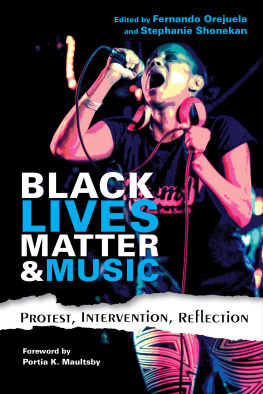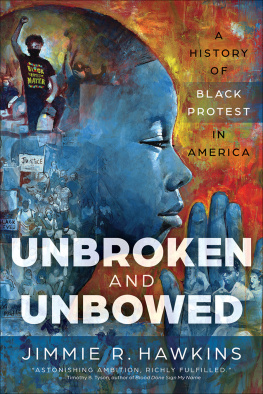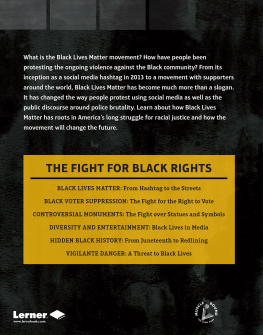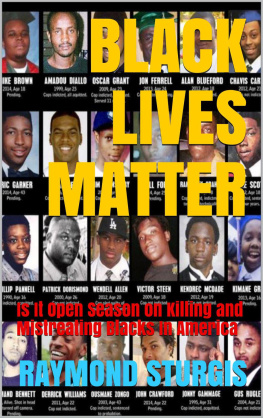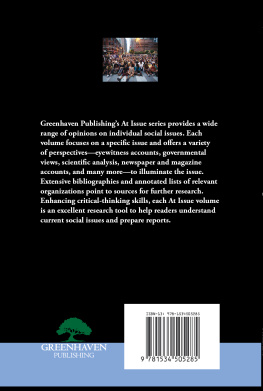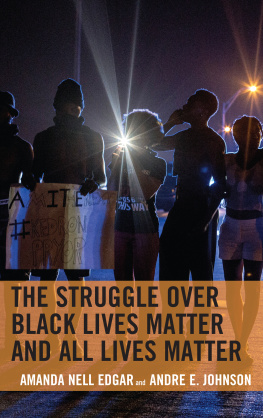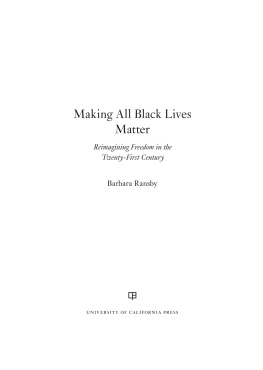Maultsby Portia K. - Black Lives Matter and music: protest, intervention, reflection
Here you can read online Maultsby Portia K. - Black Lives Matter and music: protest, intervention, reflection full text of the book (entire story) in english for free. Download pdf and epub, get meaning, cover and reviews about this ebook. City: USA, year: 2018, publisher: Indiana University Press, genre: Politics. Description of the work, (preface) as well as reviews are available. Best literature library LitArk.com created for fans of good reading and offers a wide selection of genres:
Romance novel
Science fiction
Adventure
Detective
Science
History
Home and family
Prose
Art
Politics
Computer
Non-fiction
Religion
Business
Children
Humor
Choose a favorite category and find really read worthwhile books. Enjoy immersion in the world of imagination, feel the emotions of the characters or learn something new for yourself, make an fascinating discovery.
- Book:Black Lives Matter and music: protest, intervention, reflection
- Author:
- Publisher:Indiana University Press
- Genre:
- Year:2018
- City:USA
- Rating:5 / 5
- Favourites:Add to favourites
- Your mark:
- 100
- 1
- 2
- 3
- 4
- 5
Black Lives Matter and music: protest, intervention, reflection: summary, description and annotation
We offer to read an annotation, description, summary or preface (depends on what the author of the book "Black Lives Matter and music: protest, intervention, reflection" wrote himself). If you haven't found the necessary information about the book — write in the comments, we will try to find it.
Black Lives Matter and music: protest, intervention, reflection — read online for free the complete book (whole text) full work
Below is the text of the book, divided by pages. System saving the place of the last page read, allows you to conveniently read the book "Black Lives Matter and music: protest, intervention, reflection" online for free, without having to search again every time where you left off. Put a bookmark, and you can go to the page where you finished reading at any time.
Font size:
Interval:
Bookmark:

BLACK
LIVES
MATTER
& MUSIC
Activist Encounters in Folklore and Ethnomusicology
David A. McDonald, editor
Edited by Fernando Orejuela and Stephanie Shonekan
BLACK
LIVES
MATTER
& MUSIC
PROTEST, INTERVENTION, REFLECTION
Foreword by Portia K. Maultsby
Indiana University Press
This book is a publication of
Indiana University Press
Office of Scholarly
Publishing Herman B Wells Library 350
1320 East 10th Street
Bloomington, Indiana 47405 USA
iupress.indiana.edu
2018 by Indiana University Press
All rights reserved
No part of this book may be reproduced or utilized in any form or by any means, electronic or mechanical, including photocopying and recording, or by any information storage and retrieval system, without permission in writing from the publisher. The paper used in this publication meets the minimum requirements of the American National Standard for Information SciencesPermanence of Paper for Printed Library Materials, ANSI Z39.48-1992.
Manufactured in the United States of America
Library of Congress Cataloging-in-Publication Data
Names: Orejuela, Fernando, editor. | Shonekan, Stephanie, editor.
Title: Black Lives Matter and music : protest, intervention, reflection / edited by Fernando Orejuela and Stephanie Shonekan ; foreword by Portia K. Maultsby.
Description: Bloomington : Indiana University Press, 2018. | Series: Activist encounters in folklore and ethnomusicology
Identifiers: LCCN 2018021721 (print) | LCCN 2018025099 (ebook) | ISBN 9780253038432 (e-book) | ISBN 9780253038418 (hardback : alk. paper) | ISBN 9780253038425 (pbk. : alk. paper)
Subjects: LCSH: African AmericansMusicHistory and criticism. | Black lives matter movement.
Classification: LCC ML3556 (ebook) | LCC ML3556 .B57 2018 (print) | DDC 781.5/92dc23
LC record available at https://lccn.loc.gov/2018021721
1 2 3 4 5 23 22 21 20 19 18
This book is dedicated to our teachers and mentors, especially the late Ronald R. Smith, who taught us to think critically about race, life, art, and music.
CONTENTS
/ PORTIA K. MAULTSBY
/ FERNANDO OREJUELA
/ STEPHANIE SHONEKAN
/ FERNANDO OREJUELA
/ LANGSTON COLLIN WILKINS
/ ALISON MARTIN
/ DENISE DALPHOND
/ STEPHANIE SHONEKAN
FOREWORD
Portia K. Maultsby
FOR CENTURIES VARIOUS ETHNIC, CULTURAL, and social groups throughout the world have used music as a form of resistance against dictatorial rulers, oppressive governments, and capitalist structures. Folklorists, ethnomusicologists, African Americanists, cultural historians, and cultural sociologists have long recognized the power of music to empower people, to galvanize them into political action, and to sustain social movements. Their publications critique the role of music in labor movements (Fowke and Glazer 1973; Green et al. 2007), social movements (Eyerman and Jamison 1998; Roy 2010; Reagon 2017), and individual and group acts of defiance (Levine 1977; Maultsby 2015a, 2015b; Neal 2017), as well as its use to empower during and following conflict, violence, and war (Urla 2001; Hemetek 2006; McDonald 2009; OConnell and Castelo-Branco 2010; Rogers 2012; Dave 2014). Since the seventeenth century, music has been central to the sociopolitical movements of black Americans, who continue to fight against all forms of institutional racism that impact negatively on black lives, especially in the areas of social justice, employment, housing, and education.
The Black Lives Matter movement is a contemporary expression of both pride and resistance, rooted in a tradition that began when Europeans used force to remove Africans from their homeland and place them into bondage. Chained together on the lower decks of ships and tightly packed much like sardines in a can, these black bodies endured all forms of inhumane treatment during the long voyage to the Americas. They were beaten, kicked around like animals, forced to lay in their own bodily waste, and required to dance to the beats of drums for exercise. Determined to retain their pride and dignity, on the ships and in the Americas, Africans engaged in acts of defiance by using the drum and coded song to communicate details to the masses.
Throughout the history of slavery in the United States, black male and female bodies suffered brutal beatings, dog maulings, hangings, and other savage acts of murder. In retaliation, the enslaved organized revolts and mapped out escape routes to freedom. Music played a central role in these acts of resistance. During the 1739 South Carolina Stono Rebellion, drums and loud horns became communication devices, signaling places to gather and times to strike. Following the enactment of laws by the colonies that forbade the playing of drums and other loud instruments, along with unsupervised gatherings, the enslaved turned to clandestine forms of communication. The use of the double entendre or coded texts in their spiritual songs, such as Steal Away and Follow the Drinking Gourd, provided instructions for planned escapes to freedom. The enslaved also expressed defiance through song, proudly proclaiming, Befo Id be a slave, Id be buried in my grave, And go home to my Lord and be saved.
The rise of the Ku Klux Klan (KKK) following Reconstruction and the rigid Jim Crow laws led to open attacks on black bodies. Beatings and hangings became common forms of entertainmentviolent acts of leisurein rural white communities, with members of the KKK, sheriffs, and other law enforcement officers participating in these hideous crimes. Moreover, all-white juries ruled a not guilty verdict for any white perpetrator yet imposed a guilty verdict for any black person jailed on trumped-up charges, such as disrespecting a white man or woman. Everyday life proved challenging for black men, including those working on levee camps in Mississippi. Disregarding their economic value, Memphis Slims recalls that them straw bosses would beat you dead. Mister Charlie say, Kill a nigger, hire another. But kill a mule you got to buy another. You see they treated a mule better than a Negro back then in those camps (Barlow 1989, 52).
The savage 1955 murder of Emmett Till, a fourteen-year-old boy from Chicago who had been visiting relatives in Mississippi and was accused of whistling at a white woman, continued one of many brutal acts of violence against black bodies that escalated and gave rise to the civil rights and Black Power movements. Local African American communities began organizing at the grassroots level and participating in various protest activities to force change in the oppressive conditions under which they lived. Music provided the source for inspiration and served as a tool for organizing and galvanizing communities into political action.
The Black Lives Matter movement continues the practice of using music as personal and group expressions to organize and peacefully protest racial injustices, including sanctioned police and civilian brutality against black bodies. Led by millennials in response to the unjustified murder of Trayvon Martin in 2013, followed by the killings of Mike Brown, Sandra Bland, and others in subsequent years, the scope of this movement is far-reaching. It encompasses social issues of environmental justice, criminal justice, and black political empowerment, highlighting themes of marginalization and black affirmation. Nevertheless, and overlapping the rise of the Black Lives Matter movement, we have witnessed increases in the membership of alt-right groups and the collaboration with the KKK, neo-Nazis, and neo-Confederates in public demonstrations. As they protested the removal of Confederate statues around the country, the hate rhetoric and violent activities of these groups were on full display during the Unite the Right rally in Charlottesville, Virginia (August 12, 2017), which resulted in the killing of a counterprotester and injuring several others. President Donald Trumps laissez-faire attitude toward the expressions of white supremacy organizations prompted the Black Lives Matter network to demand a ban on all Confederate iconography and hate groups in the United States and to affirm, We stand with the people of Charlottesville who are fighting for a world in which the inherent humanity of all people is honored (Morrison 2017).
Next pageFont size:
Interval:
Bookmark:
Similar books «Black Lives Matter and music: protest, intervention, reflection»
Look at similar books to Black Lives Matter and music: protest, intervention, reflection. We have selected literature similar in name and meaning in the hope of providing readers with more options to find new, interesting, not yet read works.
Discussion, reviews of the book Black Lives Matter and music: protest, intervention, reflection and just readers' own opinions. Leave your comments, write what you think about the work, its meaning or the main characters. Specify what exactly you liked and what you didn't like, and why you think so.

